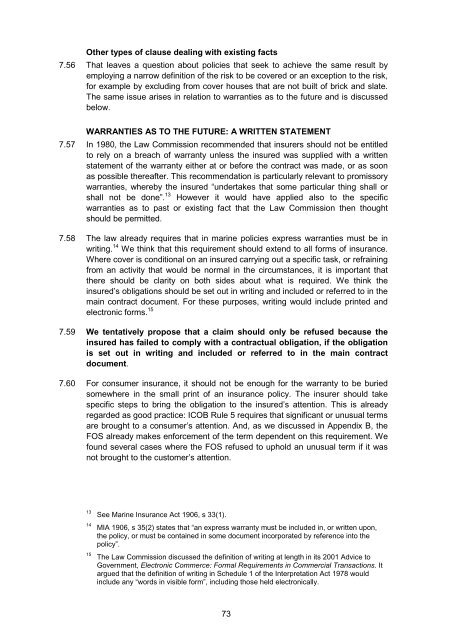Insurance Contract Law Issues Paper 2 Warranties - Law Commission
Insurance Contract Law Issues Paper 2 Warranties - Law Commission
Insurance Contract Law Issues Paper 2 Warranties - Law Commission
Create successful ePaper yourself
Turn your PDF publications into a flip-book with our unique Google optimized e-Paper software.
Other types of clause dealing with existing facts<br />
7.56 That leaves a question about policies that seek to achieve the same result by<br />
employing a narrow definition of the risk to be covered or an exception to the risk,<br />
for example by excluding from cover houses that are not built of brick and slate.<br />
The same issue arises in relation to warranties as to the future and is discussed<br />
below.<br />
WARRANTIES AS TO THE FUTURE: A WRITTEN STATEMENT<br />
7.57 In 1980, the <strong>Law</strong> <strong>Commission</strong> recommended that insurers should not be entitled<br />
to rely on a breach of warranty unless the insured was supplied with a written<br />
statement of the warranty either at or before the contract was made, or as soon<br />
as possible thereafter. This recommendation is particularly relevant to promissory<br />
warranties, whereby the insured “undertakes that some particular thing shall or<br />
shall not be done”. 13 However it would have applied also to the specific<br />
warranties as to past or existing fact that the <strong>Law</strong> <strong>Commission</strong> then thought<br />
should be permitted.<br />
7.58 The law already requires that in marine policies express warranties must be in<br />
writing. 14 We think that this requirement should extend to all forms of insurance.<br />
Where cover is conditional on an insured carrying out a specific task, or refraining<br />
from an activity that would be normal in the circumstances, it is important that<br />
there should be clarity on both sides about what is required. We think the<br />
insured’s obligations should be set out in writing and included or referred to in the<br />
main contract document. For these purposes, writing would include printed and<br />
electronic forms. 15<br />
7.59 We tentatively propose that a claim should only be refused because the<br />
insured has failed to comply with a contractual obligation, if the obligation<br />
is set out in writing and included or referred to in the main contract<br />
document.<br />
7.60 For consumer insurance, it should not be enough for the warranty to be buried<br />
somewhere in the small print of an insurance policy. The insurer should take<br />
specific steps to bring the obligation to the insured’s attention. This is already<br />
regarded as good practice: ICOB Rule 5 requires that significant or unusual terms<br />
are brought to a consumer’s attention. And, as we discussed in Appendix B, the<br />
FOS already makes enforcement of the term dependent on this requirement. We<br />
found several cases where the FOS refused to uphold an unusual term if it was<br />
not brought to the customer’s attention.<br />
13 See Marine <strong>Insurance</strong> Act 1906, s 33(1).<br />
14 MIA 1906, s 35(2) states that “an express warranty must be included in, or written upon,<br />
the policy, or must be contained in some document incorporated by reference into the<br />
policy”.<br />
15 The <strong>Law</strong> <strong>Commission</strong> discussed the definition of writing at length in its 2001 Advice to<br />
Government, Electronic Commerce: Formal Requirements in Commercial Transactions. It<br />
argued that the definition of writing in Schedule 1 of the Interpretation Act 1978 would<br />
include any “words in visible form”, including those held electronically.<br />
73

















